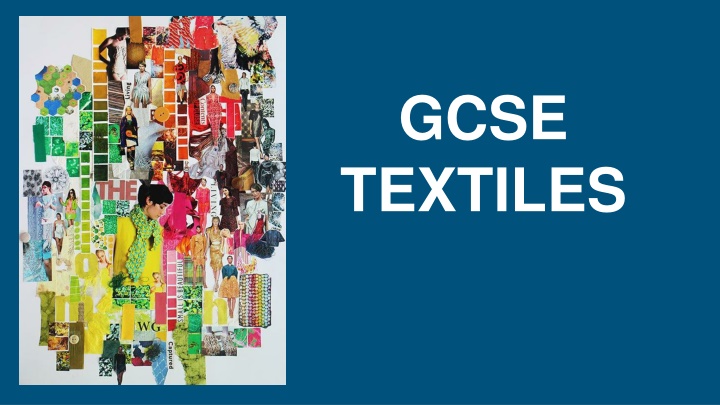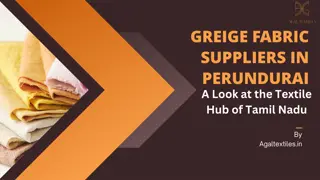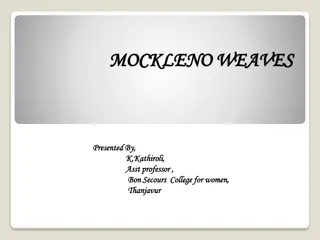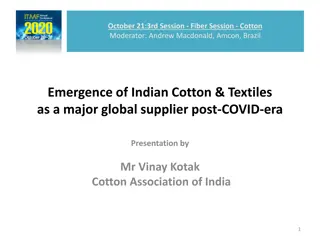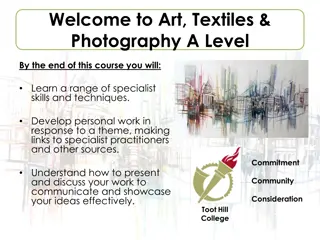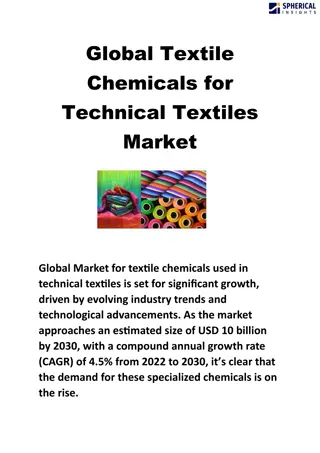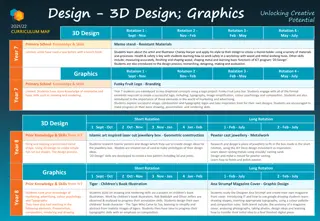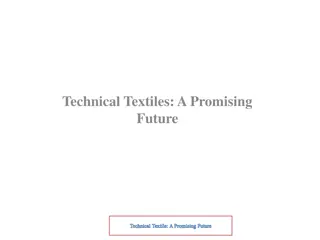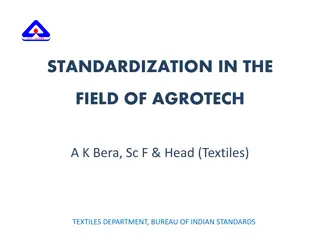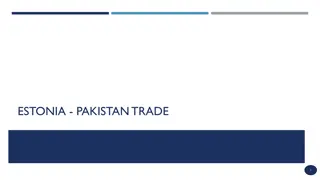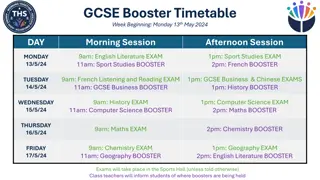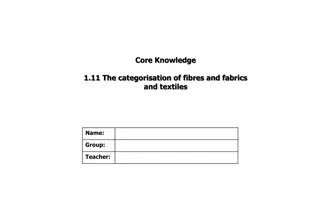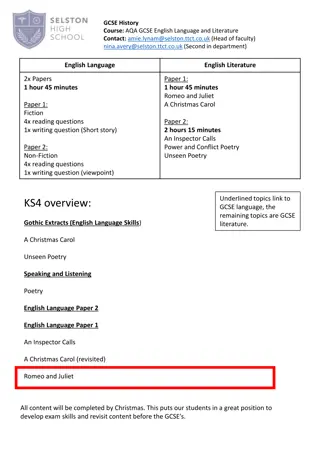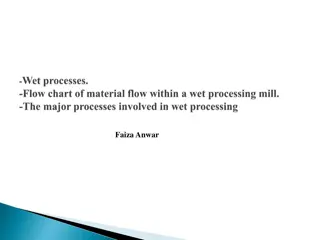GCSE TEXTILES
Delve into the intricacies of GCSE Textiles as you expand your understanding of fabrics, techniques, and design concepts. Discover a world where creativity meets functionality, and unleash your artistic potential through hands-on projects and experimentation. With a focus on practical application and theory, this course equips you with the tools to craft unique textile creations while developing a critical eye for detail and craftsmanship. Step into the realm of textiles and unlock the endless possibilities that await.
Download Presentation

Please find below an Image/Link to download the presentation.
The content on the website is provided AS IS for your information and personal use only. It may not be sold, licensed, or shared on other websites without obtaining consent from the author.If you encounter any issues during the download, it is possible that the publisher has removed the file from their server.
You are allowed to download the files provided on this website for personal or commercial use, subject to the condition that they are used lawfully. All files are the property of their respective owners.
The content on the website is provided AS IS for your information and personal use only. It may not be sold, licensed, or shared on other websites without obtaining consent from the author.
E N D
Presentation Transcript
GCSE TEXTILES
Pupil view Exam Careers Video Content Staff GCSE Art Textiles is a vibrant and dynamic course which teaches skills such as weaving, felting, stitching, appliqu , construction methods, and printing. It give students the freedom to express themselves using techniques and materials they enjoy using. It is not only inspiring and enjoyable but equips them with the skills to continue the subject with confidence at AS, A-level and beyond. Textiles gives you skills you need for employment in key growth sectors like advanced manufacturing, design, engineering and creative industries. It is the subject where you have to make decisions, plan and predict, design creative and innovative solutions to problems, evaluate and assess the consequences of your decisions. Textiles stretches and challenges you and makes you think creatively. It will hopefully inspire you to follow a career in areas which are vital for the future of our country and perhaps to be an entrepreneur who designs and makes products that people want.
Pupil view Exam Careers Video Content Staff What type of skills will I learn in Textiles? How to use specialist pieces of equipment e.g. Over lockers Computerised sewing machines Different types of Textiles materials Construction techniques Decorative techniques Using computers for designing and making Using a variety of machines New developments in Textiles The Textiles Industry
Pupil view Exam Careers Video Content Staff About the course A high percentage of the work is taught through practical experiences and small projects, which develop your level of technical skills. You will find a great deal of independent choice as well as more structured learning situations in preparation for the assessments. Pupils also be expected to enter local and nationally based competitions in order for them to gain experience and drive within the subject area. Trips to local Textile and Fashion industries is also expected.
Exam This subject comes under the Art and Design specification with the WJEC Unit 1 (60%): Portfolio (120 marks). Based on a major theme and implementing the design process, through the medium of textiles. A portfolio of evidence is required to be submitted to the very best of the pupils ability. Unit 2 (40%): Externally set assignment (80 marks). Externally set by the exam board and pupils are expected to produce a personal response to a given theme, again through the medium of textiles. Throughout the two year course, pupils will have plenty of opportunity to explore the world of textiles. They will be encouraged to experiment and construct different materials, surface design and fabrics. Pupils will be expected to be innovative and creative in their approach to the subject and challenge their way of thinking. The course also provides pupils to engage in the following topics: Constructed Textiles Digital Textiles Dyed Fabrics Printed Fabrics Fashion Design Installed Textiles Soft Furnishings Stitched Textiles, Embellished Textiles and many more
Staff Miss Owen and Mrs Forshaw are the subject specialist for Textiles. All classes will be taught by either Miss Owen or Mrs Forshaw.
Careers How Textiles will help you in the future How Textiles will help you in the future Future Careers There are many careers that you can go into with Textiles: As well as technical skills Textiles qualifications develop student s self confidence. In addition it also develops skills in ICT, decision making, team work, independence, planning and organisation. These are all important skills for entering any work place or area of further study. Besides developing a broad base of skills concerning the designing and making of products, this course is an excellent preparation for further education in Textiles. The modern Textiles industry uses some of the newest and most exciting technology and it offers students an interesting and dynamic career, with many Higher Education courses at degree and vocational level. Illustrator Interior and spatial designer Fashion designer Textile designer Community arts worker Conservator Further education teacher Graphic designer Higher education lecturer Printmaker Product designer Retail buyer Secondary school teacher Stylist Visual merchandiser Tailoring & bespoke textiles
Pupil views We do a lot of practical work and it is fun designing your own product. Textiles is challenging and you get lots of freedom to make what you want. You can use your imagination to design & make things. You can be independent and make your own choices. You can design & make things that are unique to you and it feels really good when you finish a product you have designed and made. The room is modern and you can use up to date machinery including computerised machines. Textiles is good because sometimes we work on our own and sometimes in groups. This work is interesting to learn and it is fun. It also widens your prospects and makes you think harder about everyday life.
